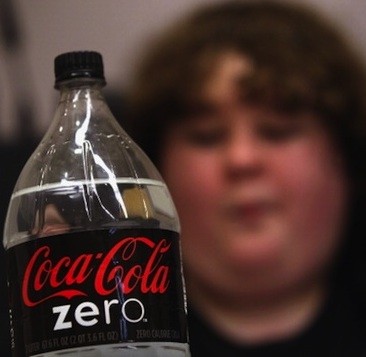A team of researchers from the University of Minnesota Medical School say, ‘Yes’. But how can that be? The good news is, the sweeteners themselves are not fattening. The bad news is, they apparently trigger metabolic reactions that cause excess storage of body fat…

The researchers, led by Dr. Lyn Steffen, wanted to see if there was a link between artificial sweeteners and cardiovascular disease risk factors.
What they did
The team performed a 20-year survey of subjects’ dietary intakes ‘paying particular attention to non-nutritive sweeteners’.
The study looked at long-term consumption of common artificial sweeteners including aspartame, saccharin and diet beverages. They wondered if there was a connection to increased storage of fat in the abdomen and in muscle tissue. I know that sounds totally counter-intuitive. But researchers had seen indications that something odd was going on.
What they found
“This study showed that habitual, long-term intake of total and individual artificial sweetener intakes are related to greater volumes of adipose tissue, commonly known as body fat,” says Dr. Brian Steffen, co-investigator on the study. “This was found even after accounting for other factors, including how much a person eats or the quality of one’s diet.”
However, the artificial sweetener sucralose did not show such a connection.
The takeaway
Among other things, the team says their findings shine a harsh light on recommendations by the American Diabetes Association (ADA). The Association has for some time recommended the replacement of added sugars with artificial sweeteners.
“This is [also] an especially timely study, given the World Health Organization’s (WHO) recent warning of the potential health risks of aspartame,” says Dr. Lyn Steffen, principal investigator on the study. “These findings underscore the importance of finding alternatives to artificial sweeteners in foods and beverages, especially since these added sweeteners may have negative health consequences.”
My take
There are some problems with the Minnesota study.
First and foremost, alternative non-nutritive sweeteners such as sucralose and stevia are considerably more expensive than the compounds commonly used by the beverage bottling and food processing industry today.
The WHO warning also played down the fact that an average person would have to consume huge amounts of artificial sweeteners to raise their cancer risk factors. Seems to me, the obesity risk factors take precedence over the cancer concerns.
Also, the team says additional research is needed to determine how the connection between artificial sweeteners and body fat works. I’m all for that.
The bottom line
Do you consume a lot of artificial sweetener?
Are you overweight or obese, in spite of cutting calories in your beverages of choice?
Would you consider cutting out beverages that contain artificial sweeteners?
Would you pay considerably more for sweeteners not connected to excess body fat storage?
Muse on that…
~ Maggie J.

